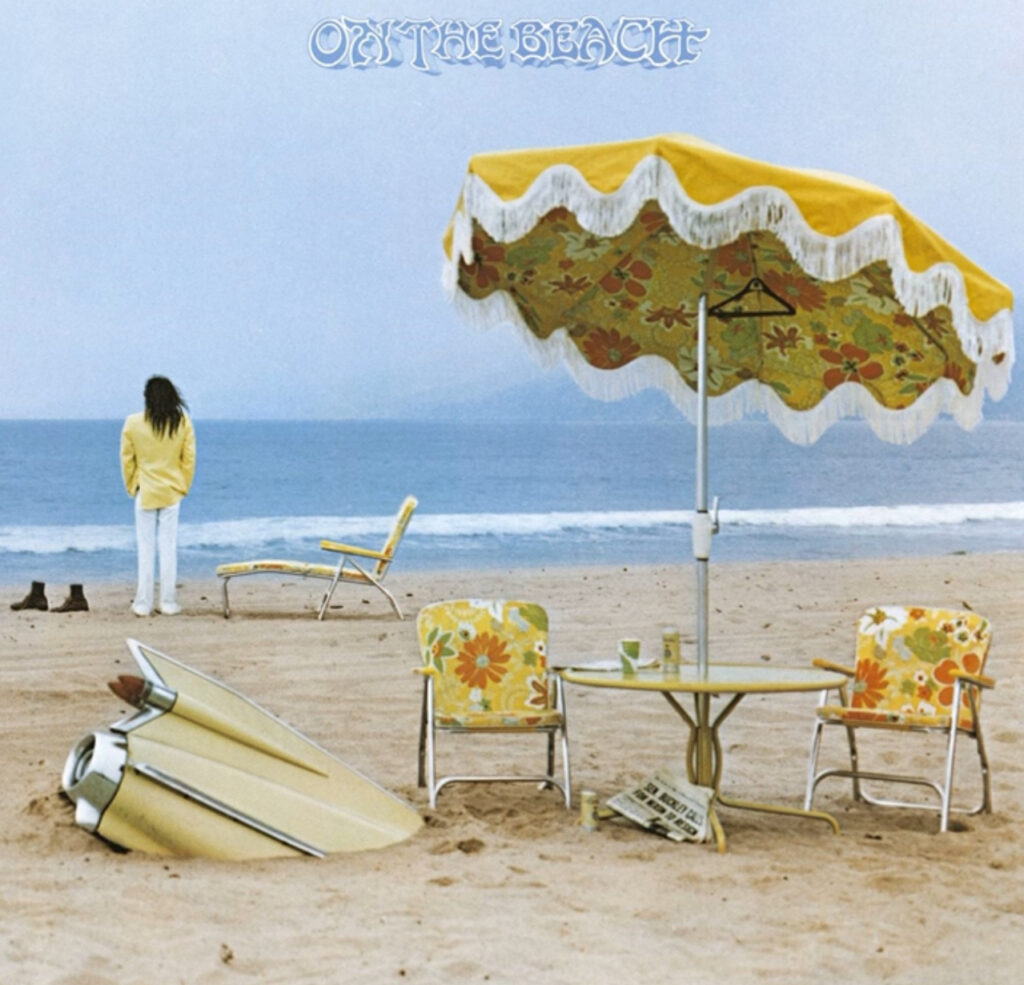Neil Young’s 1974 album “On the Beach” marked a departure from his earlier work, channeling his raw emotions into a collection of songs that reflected both personal and societal disillusionment. One track that stands out in this oeuvre is “Walk On,” the album’s opening number. While the song is deceptively upbeat in its melody and rhythm, its lyrical content and context reveal a defiant response to the chaos and criticism Young faced at that point in his career. With On the Beach, Young wasn’t merely creating music—he was processing his grief, frustration, and ultimately, his resolve to keep moving forward.
A Turbulent Era for Neil Young
By the time Young recorded On the Beach, he had experienced a tumultuous period marked by both artistic success and personal tragedy. The deaths of Crazy Horse guitarist Danny Whitten and roadie Bruce Berry, both of whom succumbed to drug overdoses, profoundly impacted Young’s emotional state. These events contributed to the dark tone of “Tonight’s the Night” (1975), recorded before On the Beach but released after it. “Walk On” serves as an antidote to that darkness—a small but significant step away from despair.
Young was also navigating a tense relationship with his audience and critics. His recent albums—Harvest (1972) and Time Fades Away (1973)—had divided opinions. Harvest propelled him to stardom, while Time Fades Away, a live album featuring new material, was seen as an abrasive, sobering follow-up. Amidst all this, On the Beach* emerged as a raw and introspective project, with “Walk On” signaling his readiness to confront these issues head-on.
Analysis: A Defiant Message Wrapped in a Breezy Sound
Musically, “Walk On” is deceptively lighthearted, featuring a mid-tempo groove underpinned by drummer Levon Helm of The Band and bassist Tim Drummond. The arrangement feels relaxed, almost laid-back, with the slide guitar’s subtle embellishments adding a touch of melancholy to the otherwise buoyant melody. This contrast between sound and sentiment is typical of Young, whose ability to craft deceptively simple songs with profound depth has always set him apart.
The lyrics of “Walk On” directly address Young’s critics and the pressure he faced to conform to expectations. In the first verse, he sings:
> “I hear some people been talkin’ me down,
> Bring up my name, pass it ’round.”
Here, Young acknowledges the whispers and criticisms but doesn’t dwell on them. Instead, he dismisses them with a nonchalant shrug, moving on to the chorus, where he repeats, “You can’t please everyone, so you got to please yourself.” This line is at the heart of “Walk On”—a declaration of independence and a reaffirmation of artistic integrity. Despite his fame and the conflicting demands placed upon him, Young remains steadfast in his commitment to authenticity.
Defiance and Acceptance
“Walk On” could be interpreted as Young’s way of brushing off the negativity and external pressures that threatened to derail him. Yet, there’s a complexity in his message. He’s not simply rejecting his critics but accepting that conflict and criticism are part and parcel of his position. There’s a sense of reluctant acceptance and weary wisdom in his delivery.
The second verse takes this sentiment further:
> “I remember the good old days,
> Stayed up all night gettin’ crazy.”
Young references his past with a mix of nostalgia and resignation. The “good old days” may have been carefree, but they also led to pain and loss, suggesting that moving forward is not just a choice but a necessity. The song’s refrain, “Walk on,” becomes a mantra—a reminder to keep going no matter what.
A Shift in Perspective
Compared to the rest of *On the Beach*, which dives deep into themes of alienation and disillusionment, “Walk On” stands as a moment of cautious optimism. Tracks like “Revolution Blues” and “Ambulance Blues” are steeped in paranoia and bitterness, while “Walk On” feels almost breezy in its resolve. It’s a departure from the sense of helplessness that permeates the album, signaling that, for all the darkness, there’s still a path forward.
This contrast makes “Walk On” a crucial piece of *On the Beach’s* narrative arc. It sets the stage for the introspective journey that follows, offering a brief respite before delving into the more harrowing reflections on fame, love, and existential dread. As such, it’s a song of transition, bridging the gap between the disillusioned Young of *Time Fades Away* and the reflective, albeit still unsettled, figure we encounter in the album’s later tracks.
Legacy: A Song of Endurance
“Walk On” has endured as one of Neil Young’s understated anthems. While it doesn’t carry the immediate impact of his more famous hits, its enduring appeal lies in its universality. We all face criticism, adversity, and moments when we must decide whether to conform or stay true to ourselves. In this sense, “Walk On” transcends its context, becoming a timeless reminder to persist and push through, regardless of external noise.
Young would go on to revisit themes of endurance and resilience throughout his career, but “Walk On” stands as one of his earliest declarations of defiance. Its juxtaposition of lightness and weight, of a breezy melody with introspective lyrics, encapsulates his singular ability to turn personal turmoil into art that resonates across generations.
In the broader context of *On the Beach*, “Walk On” is not just an opening track but a statement of purpose. It’s an invitation to walk with Young through the album’s emotional landscape, acknowledging the hardships while refusing to be defined by them. As we listen, we, too, are reminded to keep walking on, no matter what shadows loom ahead.
No comments yet.








